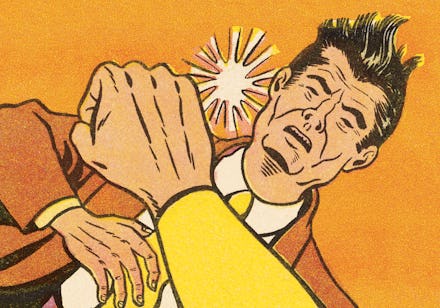Why some people just have a very punchable face

I’ve always considered myself a lover, not a fighter. And yet, Hulu’s Fyre Fraud made me question myself. If you haven’t seen it, it’s a documentary about how Billy McFarland scammed people into buying tickets to a bougie music festival that turned out to be a total dumpster fire. “Ugh, I just hate his face,” I thought as I watched interviews with McFarland when the doc came out last year. Everything from his fake, smug smile to his vapid stare just screamed “punch me.” Why did his face annoy me so much, though? And is there such a thing as a punchable face?
Imagine all the judgments you’ve ever made about others’ appearances. In some of those cases, many people would’ve agreed with you, Alexander Todorov, a professor of psychology at Princeton University, tells Mic. But in others, your judgments were probably highly idiosyncratic, shaped by your culture, experiences, and other factors. So, if you find yourself fantasizing about punching someone in the face, your urges may stem from general facial attributes people tend to weigh negatively, or simply your own subjective taste. Prior knowledge about the person could also shape how you perceive their face.
But first, let’s zoom into what happens in your brain when you perceive a stranger’s face. “These judgments are fairly automatic,” says Todorov, whose research group found that flashing a face onscreen for even 50 milliseconds allowed participants enough time to make all kinds of judgments about its trustworthiness and attractiveness. Such snap judgments are highly superficial, though, often reflecting the state of the person being perceived only in that moment, not overall.
Negative judgments tend to come on faster, says Richard Cytowic, a professor of neurology at George Washington University. They’re not always accurate, but it’s safer to avoid something that turned out not to be a threat after all than mull it over and endanger yourself in the process. Overall, this has offered an evolutionary advantage, helping humans decide in a pinch whether to avoid someone, or form the social bonds with them that continue to be crucial for survival.
This process is different when you perceive faces of people you know or are familiar with, since they come with their names, their personalities, your memories of them — “lots of rich information,” Todorov says. And if these faces belong to shitty people, like McFarland, “you can’t remove this knowledge…. This face would always come with a reminder of what this person did.” In other words, my fantasy about punching McFarland in the face might very well have stemmed from knowing about how royally he’d screwed people over.
As far as Todorov knows, no one’s looked at what makes you perceive a face as annoying, but he and his lab have investigated what makes you perceive it as unattractive or untrustworthy, which may have some overlap. Their website has videos of computer-generated faces associated with attractiveness and other traits, starting with a neutral face, which progresses to faces strongly associated with these traits, followed by those weakly associated with them. They reveal that frowning, masculine faces tend to be viewed as unattractive, untrustworthy, and unlikeable. No single feature will sway you one way or the other — like, say, a crooked smile — but rather, your holistic view of the face in question.
It’s also possible that you’ve mistaken fear for annoyance, Cyotwic says; a scowl, bared teeth, and narrowed forehead can evoke fear. He recalls feeling uneasy while watching Ted Cruz in a 2016 presidential debate, specifically because of his atypical facial expressions. Rather than a smile with the eyes crinkled around the edges and raised eyebrows, as you’d expect from a politician seeking to win people over, his eyebrows and the corners of his mouth were turned downward. “That’s more what you see in anger, like a scowl.”
No single feature will sway you one way or the other — like, say, a crooked smile — but rather, your holistic view of the face in question.
Todorov also notes that there’s “tremendous individual variation” in our impressions of people’s faces. In other words, there’s no such thing as a universally punchable face; what you find annoying has been shaped by the entire history of how society, your parents, and other factors have conditioned you, Cytowic says.
Culture matters, too. If you grew up in a certain ethnic group, you’re more likely to view people within that group as more typical and trustworthy than those outside it, Todorov explains. You also tend to gravitate more to faces that resemble those of your relatives or people you like.
So, what should you do if someone’s face annoys the shit out of you, especially if they’re an unwitting stranger you know nothing about? Todorov suggests reminding yourself that our judgments of strangers’ faces are extremely superficial and most likely inaccurate. “My advice would be to stop and step back,” Cytowic adds.
Dissect what you mean by “annoying." Why does this person’s face annoy you? Unlike fear, which is a universal emotion, annoyance is so much a matter of context — meaning that finding their face annoying may say more about you than them, Cytowic says. Besides my indignation at McFarland’s scammy vibes influencing how I see his face, I wonder if his disingenuous, try-hard expression somehow triggers my own insecurities around being liked.
That said, McFarland definitely deserves a face-punching. But now I feel less like a judge-y asshole and more like someone who just needs to remember to question her impulses and where they come from, like any human.